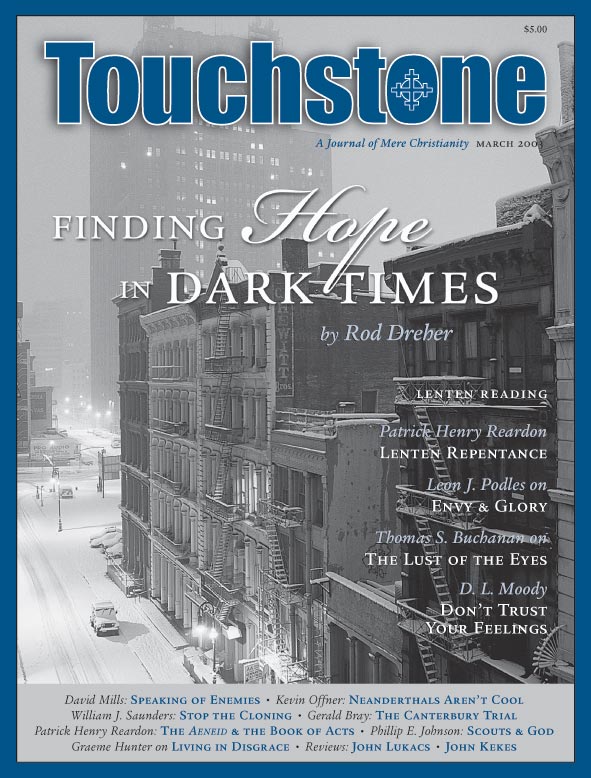Stop the Cloning
On the third day of Christmas, Clonaid, a company associated with the Raelian cult, gave to the world not the traditional three French hens, but one live-born human “clone,” a baby girl nicknamed Eve. Whether or not Clonaid actually brought a human clone to birth—most scientists doubt that it did—and whatever one thinks of the Raelians—who believe human beings were created by extraterrestrials—the issue of cloning is a serious one that deserves the public attention it has received recently. America needs to decide sooner rather than later what legal and ethical limits it will place on the practice of human cloning.
Those promoting cloning argue that Clonaid’s announcement will cause a public backlash against cloning, leading to a total ban on human cloning in the United States. A drumbeat of articles has been arguing that we should not let the revulsion and repugnance we feel in reaction to Eve’s birth lead us to ban all human cloning. Op-eds have appeared in the Wall Street Journal, the Washington Post, and the New York Times sounding these themes. But those articles—and those arguments—are based on faulty premises. Once those premises are exposed, it should be clear that it is quite right to ban human cloning of any type.
Although cloning proponents maintain that there are two different kinds of human cloning, “reproductive cloning” and “therapeutic cloning,” the scientific fact is that all human cloning is reproductive because it creates a living human being (in the embryonic stage of life). Whether a cloned embryo is created to bring it to live birth or to be destroyed for biomedical research, a human being has been created. True, it is a very early stage of human life, but the cloned human embryo, just like the embryo produced by sexual intercourse, will proceed through every stage of human life—embryonic, fetal, infantile, adult—unless something intervenes to stop it. Since the new embryo created by cloning is a living human being, experimental research that destroys it is anything but harmless—in fact, it is lethal. Calling such destructive research “therapeutic” is a serious distortion of language.
The real distinction to make is not between the uses of cloned human embryos, but between the ends pursued by cloning advocates and the means required to achieve them. The development of medical cures is certainly a good end, but the deliberate creation and destruction of human life is an unethical means of realizing it. That is not a “religious” position. Rather, it is a position that reflects the ethical consensus of the civilized world following the inhumanities of World War II and expressed in the Nuremberg Code—there shall be no experimentation on a human subject when it is known ahead of time that it will result in the death of the subject (Principle 5).
Moreover, there are ethical means of obtaining stem cells from umbilical cords and adults, which do not require the creation and destruction of cloned human embryos. Experimental research involving these stem cells has demonstrated great promise in helping cure various diseases. As Eric Olson, chairman of molecular biology at the University of Texas Southwestern Medical Center, commented to the Washington Post, almost “every other week there’s another interesting finding of adult stem cells turning into neurons or bloods cells or heart muscle cells.” In fact, during the last two weeks of 2002, two reports were released, one from Indiana University and the other from Germany, that reveal the extraordinary potential of adult stem-cell research.
What about using cloned human embryos to bring them to live birth? Cloning advocates often state that they are against using cloned embryos in this way. However, past and recent statements reveal that their opposition to producing cloned human babies is rather hollow. Their only problem with live-birth cloning is that the process is currently unsafe and dangerous for mother and child. We know this because when scientists bring other cloned mammals to birth, such as sheep, they are usually disfigured or develop serious health problems.
Beyond the fact that cloning is risky, however, cloning proponents, as in the three articles mentioned above, have made it clear that they have no problem with cloning human embryos and bringing them to live birth. After all, they say, nature has its own form of cloning: identical twins. So what’s wrong with a little laboratory cloning? If live-birth cloning were perfected, it would help infertile couples, lesbians, and other folks who desire children to have a child of their very own. Cloning, they contend, would meet an unmet need. What’s wrong with that?
Besides the fact that adoption presents a ready solution to those who want a child but cannot have one in the ordinary way, there are many reasons why “live-birth” cloning is wrong. For instance, while twinning in nature produces a brother or a sister, live-birth cloning produces . . . what? A “twin”? But the donor of the genetic material (the DNA) used to produce the clone is already alive and born, in some cases even middle-aged. Could that person’s genetically identical cloned baby be his “twin”? Or would the clone be instead a “son” or “daughter” of the person supplying the DNA for the clone? Would this be so even though the clone would have only one “parent” (the person supplying the DNA)? The resolution of these difficult, and strange, questions poses significant problems, not only for inheritance law, but for the very nature of family relationships.
A study conducted by the Pew Research Center shows that 77 percent of Americans oppose experimental research on human cloning. A 2002 Gallup poll showed that 90 percent oppose live-birth cloning. They are wise to do so. As Leon Kass, the chairman of President Bush’s Council on Bioethics, has warned us, the debate over human cloning concerns whether we will choose to “put human nature itself on the operating table, ready for alteration, enhancement, and wholesale redesign.”
—William L. Saunders, for the editors
William L. Saunders is Senior Fellow and Director of the Center for Human Life and Bioethics of the Family Research Council.
William L. Saunders is Senior Vice President and Senior Counsel at Americans United for Life.
subscription options
Order
Print/Online Subscription

Get six issues (one year) of Touchstone PLUS full online access including pdf downloads for only $39.95. That's only $3.34 per month!
Order
Online Only
Subscription

Get a one-year full-access subscription to the Touchstone online archives for only $19.95. That's only $1.66 per month!
bulk subscriptions
Order Touchstone subscriptions in bulk and save $10 per sub! Each subscription includes 6 issues of Touchstone plus full online access to touchstonemag.com—including archives, videos, and pdf downloads of recent issues for only $29.95 each! Great for churches or study groups.
Transactions will be processed on a secure server.
more from the online archives
calling all readers
Please Donate
"There are magazines worth reading but few worth saving . . . Touchstone is just such a magazine."
—Alice von Hildebrand
"Here we do not concede one square millimeter of territory to falsehood, folly, contemporary sentimentality, or fashion. We speak the truth, and let God be our judge. . . . Touchstone is the one committedly Christian conservative journal."
—Anthony Esolen, Touchstone senior editor










